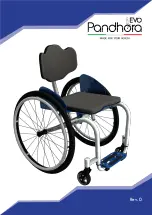
10
EASY 200-300,
ENGLISH
DANGER!
CHOKING HAZARD
– This mobility aid uses small parts which
under certain circumstances may present a choking hazard to
young children.
NOTE:
•
The effect of the knee-lever brake as well as the general
driving characteristics are dependant on tyre pressure. The
wheelchair is significantly lighter and easier to manoeuvre
when the rear wheels are pumped up correctly and both
wheels have the same pressure.
•
Make sure that your tyres have sufficient tread!
•
Please note that you are subject to any and all traffic laws
when driving in public traffic.
•
When it is dark, please wear light clothing or clothing with
reflectors, so that you can be seen more easily. Make sure
that the reflectors on the side and back of the wheelchair
are clearly visible. We would also recommend that you fit
an active light.
•
Always be careful with your fingers when working or
adjusting the wheelchair!
The products shown and described in this manual may not be
exactly the same in every detail as your own model. However,
all instructions are still entirely relevant, irrespective of detail
differences.
The manufacturer reserves the right to alter without notice any
weights, measurements or other technical data shown in this
manual. All figures, measurements and capacities shown in this
manual are approximate and do not constitute specifications.
Lifetime
The expected lifetime of this product is 5 years.
•
Before setting off, check that your tyre pressure is correct.
For rear wheels it should be at least 3.5 bar ( 350 kPa).
The max. pressure is indicated on the tyre.The knee-lever
brakes will only work if there is sufficient tyre pressure and
if the correct setting has been made (see the Chapter on
“Wheel locks”).The wheel locks are not intended to brake
your wheelchair. They are only there to ensure that your
wheelchair does not begin rolling unintentionally. When you
stop on uneven ground, you should always use the wheel
locks to prevent such rolling. Always apply both wheel
locks; otherwise, your wheelchair could tip over.
•
The wheel locks have not been designed to be used as brakes
for a moving wheelchair.
•
Always make use of elevators and ramps. If these are not
available, you should request the help of an attendant. They
should only grip the wheelchair at securely mounted parts.
If anti-tip tubes are fitted these must be folded away. A
wheelchair should never be lifted with an occupant; it should
only be pushed.
•
If the seat and back sling are damaged, you must replace them
immediately.
•
Do not lift or carry the wheelchair by the backtubes or the
pushhandles.
•
Do not fit any unauthorized electronic equipment, powered
or mechanically operated mobility drives, hand-bike or any
other device that changes the intended use or the structure of
the wheelchair. Any combination with other medical devices
requires the approval of Sunrise Medical.
•
Be careful with fire, in particular with burning cigarettes. Seat
and back slings can be set alight.
•
If and whenever possible, during a journey in a specially fitted
vehicle for disabled people, vehicle occupants should use
the seats in the vehicle and the appropriate restraint system.
This is the only way to ensure that occupants will have the
maximum protection if there is an accident. When using safety
elements offered by SUNRISE MEDICAL and using a specially
designed safety system, lightweight wheelchairs can be used
as a seat when being transported in a specially fitted vehicle.
(See the Chapter on “Transportation”).
•
Always make sure that the quick-release axles on the rear
wheels are set properly and lock in. If the button on the
quick-release axle is not pressed in, the rear wheel cannot be
removed.
•
In particular when using lightweight metal handrims, fingers will
easily become hot when braking from a high speed or on long
inclines.
•
If the wheelchair is subject to direct sunlight for a long period of
time, then parts of the wheelchair (e.g. frame, legrests, brakes
and sideguard) may become hot (>41°C).
•
To avoid hand injuries do not grab in between the spokes
or between the rear wheel and wheel lock when driving the
wheelchair.
•
When using the chair outside, always wear leather gloves
which will increase your grip and protect the fingers from dirt
and overheating.
•
Do not use the wheelchair on slopes > 10°.
•
The Dynamic safe slope is dependant on the chair
configuration, the users abilities and the style of riding. As the
users abilities and style of riding cannot be pre-determined
then the max safe slope cannot be determined. Therefore
this must be determined by the user with the assistance of
an attendant to prevent tipping. It is strongly recommended
that inexperienced users have Ant-tips fitted.Do not use your
wheelchair on muddy or icy ground.Do not use your wheelchair
where pedestrians are not allowed.
•
With all moving parts there is a natural risk of finger traps.
Please handle with care
•
The wheelchair should not be used in heavy rain, snow, slip-
pery, or unsound surfaces.Do not use the wheelchair in hazar-
dous environments.











































